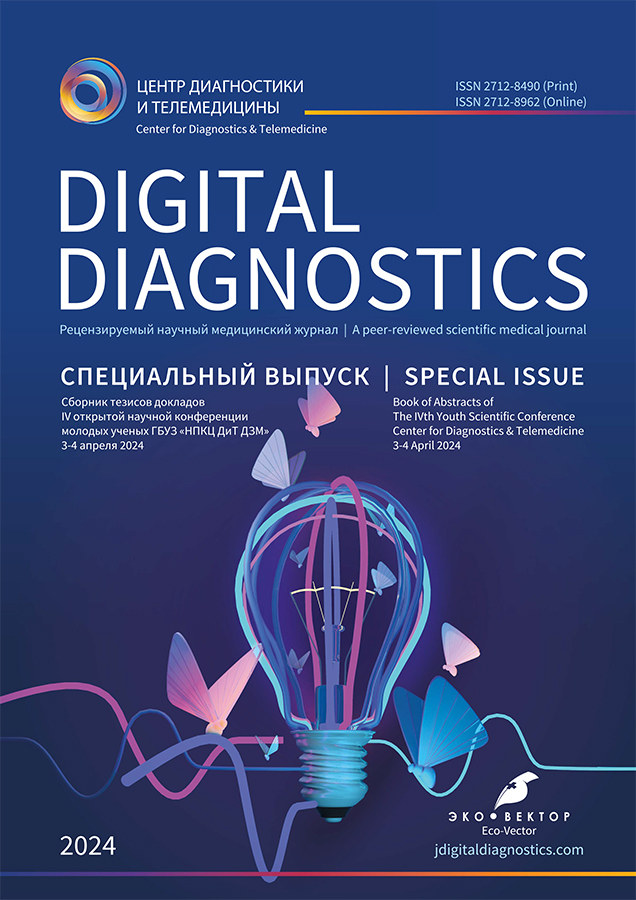Changes on diffusion-weighted MRT (DWI) in the hippocampus in transient global amnesia
- 作者: Kokukhin A.V.1, Zhuravlev M.N.1, Ponomareva E.A.1, Bakieva R.F.1, Stremaus E.P.1, Zhigalova E.L.1, Murunov S.A.1, Yatsenko Y.V.1
-
隶属关系:
- Regional Clinical Hospital No. 2
- 期: 卷 5, 编号 1S (2024)
- 页面: 140-142
- 栏目: 青年科学家的文章
- ##submission.dateSubmitted##: 15.02.2024
- ##submission.dateAccepted##: 13.03.2024
- ##submission.datePublished##: 03.07.2024
- URL: https://jdigitaldiagnostics.com/DD/article/view/627030
- DOI: https://doi.org/10.17816/DD627030
- ID: 627030
如何引用文章
全文:
详细
Transient global amnesia (TGA) is considered as one of the variants of transient ischemic attack (TIA). Unlike the diagnosis of cerebral infarction, the definition of TIA presupposes not only the reversibility of neurological symptoms, but also the absence of morphological signs of cerebral infarction detected by imaging methods. While the clinical diagnosis of TGA is not difficult, there is no clear opinion regarding changes on MRI. The use of high-field MRI devices (3T, 7T) shows a fairly high frequency of detecting point DWI changes in the hippocampal projection (up to 50%), which can be used as one of the objective criteria for the diagnosis of TGA全文:
BACKGROUND: Transient global amnesia is considered a variant of transient ischemic attack. Unlike the diagnosis of brain infarction, the definition of transient ischemic attack implies both the reversibility of neurological symptoms and the absence of morphological signs of brain infarction detected by imaging methods. While the clinical diagnosis of transient global amnesia is not difficult, there is no unambiguous opinion regarding changes on magnetic resonance imaging. The use of high-field magnetic resonance imaging devices (3T, 7T) show quite a high frequency of detecting point DWI changes in the hippocampal projection (up to 50%), which can be used as one of the objective criteria for the diagnosis of transient global amnesia [1].
AIM: The study aimed to analyze a group of patients with a clinical diagnosis of transient global amnesia who underwent magnetic resonance imaging of the brain.
MATERIALS AND METHODS: The medical records of patients with a clinical diagnosis of transient global amnesia who were hospitalized in 2022–2023 and in whom the results of magnetic resonance imaging in DWI mode revealed changes in the hippocampal projection were analyzed.
RESULTS: The Regional Vascular Center of the Regional Clinical Hospital No. 2 in Tyumen reports that transient ischemic attack accounts for approximately 5.5% of all patients with acute cerebral circulatory disorders annually. Among patients with transient ischemic attack, the frequency of transient global amnesia was 17.2% to 26.2%. Magnetic resonance imaging revealed changes in 11 patients, with an age range of 48 to 69 years. The study included seven female participants. In all women and three men, a single focus (3–4 mm) was hyperintense in DWI mode and localized in the projection of the left hippocampus. In one case, a 62-year-old man, a 7-mm focus was localized in the projection of the right hippocampus and combined with a 12-mm focus in the left occipital lobe. In the medical history, there was evidence of a previous cerebrovascular accident and myocardial infarction, in addition to the use of rivaroxaban for atrial fibrillation. All 11 patients exhibited complete regression of the clinical manifestations of transient global amnesia within a day.
CONCLUSIONS: A review of the literature and our own observations indicates that the vascular nature of transient global amnesia warrants further discussion, even in the case of pinpoint foci in the hippocampal projection, particularly in the absence of significant vascular risk factors. The probability of a vascular etiology for transient global amnesia is higher when foci in the hippocampus are combined with additional foci outside the hippocampus and risk factors are identified. It is recommended that the indications for performing magnetic resonance imaging in DWI mode be expanded to include patients with transient global amnesia within the first 24 to 72 hours.
We put forth the hypothesis that in patients presenting with cryptogenic ischemic stroke, the functional transient global ischemia syndrome should be employed as a diagnostic tool. We posit that the observation of this patient population is of significant interest.
作者简介
Alexey Kokukhin
Regional Clinical Hospital No. 2
编辑信件的主要联系方式.
Email: aleksei89@mail.ru
ORCID iD: 0000-0002-4611-3284
SPIN 代码: 9056-1235
俄罗斯联邦, Tyumen
Mikhail Zhuravlev
Regional Clinical Hospital No. 2
Email: mishazhur@rambler.ru
ORCID iD: 0000-0002-1930-2928
俄罗斯联邦, Tyumen
Elena Ponomareva
Regional Clinical Hospital No. 2
Email: metajoie@gmail.com
俄罗斯联邦, Tyumen
Railya Bakieva
Regional Clinical Hospital No. 2
Email: 1010ra@mail.ru
俄罗斯联邦, Tyumen
Ekaterina Stremaus
Regional Clinical Hospital No. 2
Email: suamerts-05@mail.ru
俄罗斯联邦, Tyumen
Evgenia Zhigalova
Regional Clinical Hospital No. 2
Email: Zhiga-zhenya@yandex.ru
俄罗斯联邦, Tyumen
Sergey Murunov
Regional Clinical Hospital No. 2
Email: Mytynov91@mail.ru
俄罗斯联邦, Tyumen
Yana Yatsenko
Regional Clinical Hospital No. 2
Email: janayanaa23@yandex.ru
俄罗斯联邦, Tyumen
参考
- Sander D, Bartsch T, Connolly F, et al. Guideline “Transient Global Amnesia (TGA)” of the German Society of Neurology (Deutsche Gesellschaft für Neurologie): S1-guideline. Neurological Research and Practice. 2023;5(1):15. doi: doi: 10.1186/s42466-023-00240-0
补充文件













